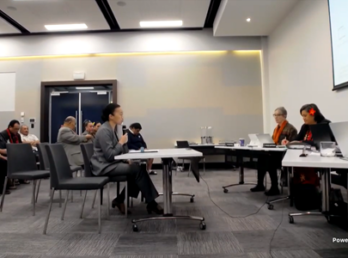What to do When Your Relationship Goes Pear-Shaped articles
Date
13 Jul 2023
Related Expertise
The end of a relationship can be intensely stressful time. On top of any difficult feelings you may have about your ex-partner, the uncertainty around what to do next can cause additional anxiety. There are a lot of unknowns, and you may be concerned about what to do next to protect yourself, your children or your assets. Fortunately, there are steps you can take to ensure your best interests are taken care of.
Counselling
If your relationship has come to an end, counselling is a great first step to help you process your emotions and come to terms with any big changes. Separation is a major life event, so take some time to talk things over with family and friends.
Separation and divorce have different meanings in New Zealand. You can agree to separate at any time, but you can only legally dissolve your marriage or civil union (divorce) if you have been living apart for two years or more, and either you or your ex-partner lives in New Zealand.[1]
Childcare agreements
If you and your partner separate and you have children, it is important that you try to reach an agreement on childcare together. The more you can agree on in writing, the smaller the chance of disagreement down the line.
The key focus in any parenting agreement needs to be the ‘welfare and best interests of the children’.[2] This is because if matters progress to the Family Court, Judges are bound by law to give those needs priority.
Try to consider:
- Will you share care equally, or will one person have primary custody (“day-to-day care”) of the children?
- If one parent has day-to-day care, how often will the other parent have contact with the children?
- How will care arrangements differ during school holidays, or on special occasions such as Christmas, birthdays, Mother’s and Father’s day?[3]
It is also important to consider any differing opinions you may have on big issues, such as:
- where your children go to school,
- where they live,
- what religion they practice, or;
- what medical treatments they may receive.
These are called guardianship issues. They must be agreed on between both parents, even if one has the children full-time and the other only has contact.

If you want to understand the effect a separation might have on your children and how you can keep your children out of conflict, it is recommended you attend a free “Parenting through Separation” course. These courses contain practical advice on how to navigate parenting issues and what care arrangements would best suit your child based on their developmental needs. You and your ex-partner can attend these courses separately.
If you find that you and your ex-partner need help clarifying what care arrangements should be in place for your children, there are a few options:
The Family Dispute Resolution (FDR) service, is a way where parents can work with a mediator to try and reach a parenting agreement without the Court’s involvement. If there is an agreement, you will get a written record of what care arrangements you agreed to at FDR. Unless special circumstances apply, you usually have to attend both a Parenting Through Separation course and FDR before you can apply to the Family Court for orders.
If you are unable to engage or reach a parenting agreement through FDR, or your matter is urgent (your or your children may face undue hardship or your safety might be at risk), please get in contact with us. We can guide you on what steps are available and how the Court can best assist you.
Family violence
If you or your children are experiencing family violence and have urgent safety needs, there are ways to ensure you are safe while any parenting or property matters are ongoing. The Family Law team at Stace Hammond can help by providing confidential advice and guidance.
Dividing your property
When a marriage, civil union or de facto relationship lasts three years or more, the Property (Relationships) Act 1976 (PRA) presumes as a starting point that both parties are entitled to an equal share of all relationship property.[4]
Generally, relationship property includes:
- The family home and family furniture (regardless of who paid for them),
- The family car;
- Property acquired during the relationship;
- Contributions to superannuation, Kiwisaver and insurance policies after the relationship began;
- Debts; and,
- Property owned jointly by the parties.
Determining what is ‘relationship property’ and what is ‘separate property’ can be a difficult exercise. Something you bought for yourself during the relationship may not necessarily be considered separate property if it has been used for relationship purposes. Lawyers who specialise in Property (Relationship) Act 1976 proceedings can help you navigate that space.
Do we really have to divide our property equally?
In some instances, you or your ex-partner can depart from equal sharing under the Property (Relationships) Act 1976. One of those ways is by agreement under a section 21A division of relationship property agreement.
Under these agreements, the parties can agree to an ‘unequal’ division of relationship property. To achieve this, both parties should fully disclose the extent of the relationship property pool including any interests that were attained during the relationship or used for the purposes of the relationship.
The parties will also need to make sure that each receives independent legal advice on the effects and implications of the proposed division including what entitlements they may be forgoing under the Property (Relationships) Act 1976 and other relevant laws. The lawyer that advises the party must also be the lawyer that witnesses that person’s signature in the agreement.
You can agree informally how to divide your property without going to court. However, you run the risk of ex-partners coming back seeking further property or compensation if this is not done formally by either a fully executed section 21A agreement or Court order.
If you and your ex- partner are not on good terms, it is best that you engage in a family lawyer who can help you navigate what is needed for a final division of relationship property.
If you are unable to reach agreement with your ex-partner, or you are unsure about whether the Property (Relationships) Act 1976 applies to you, please get in contact with us.
Claudia Russell works alongside Aroha Fletcher in Stace Hammond’s Family Law team. She is a member of the New Zealand Law Society Family Law Section and Auckland Women Lawyers’ Association. She provides advice and assistance on matters relating to parenting disputes, contracting out and separation agreements, issues relating to family violence, and paternity concerns.
Contact her at: claudiar@shlaw.co.nz
Phone: 09 307 7907
Or: advice@shlaw.co.nz
[1] Ministry of Justice, ‘Separation and Divorce’ < https://www.justice.govt.nz/family/separation-divorce/apply-for-a-divorce/#:~:text=’Dissolving%20a%20marriage%20or%20civil,by%20making%20a%20Dissolution%20Order >
[2] Article on Welfare and Best interests of the Child, Claudia Russell, June 2023 Stace Hammond.
[3] Ministry of Justice, ‘Agree on a Parenting Plan’ < https://www.justice.govt.nz/family/care-of-children/parenting-through-a-break-up/agree-on-a-parenting-plan/ >
[4] Property (Relationships) Act 1976, section 1, < https://www.legislation.govt.nz/act/public/1976/0166/latest/whole.html#DLM441220 >
Subscribe
Get insights sent direct to your email.





















